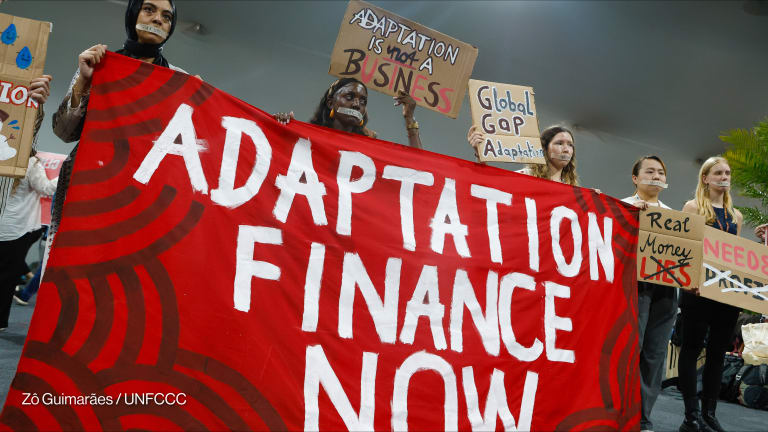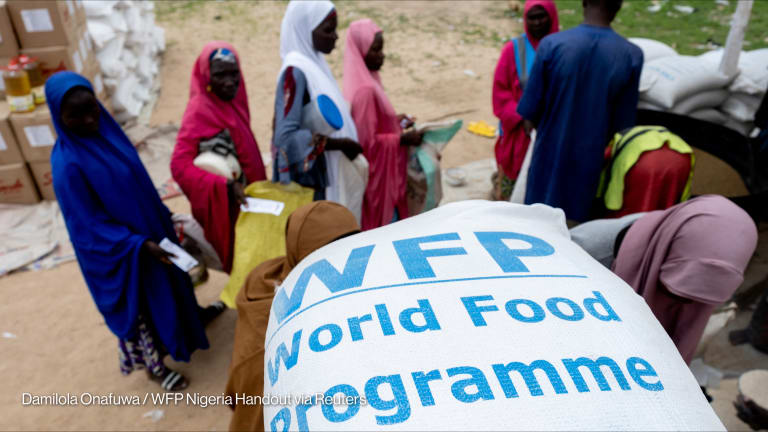Opinion: COP 27 must prioritize food systems' climate adaptation

Recent years have seen a systemic failure of international policy fora to recognize the crisis affecting food systems and the urgent need to fund measures to address the multidirectional links between food and climate change. Past COPs, in particular, have given little or no recognition to the critical importance of food and food systems. African leaders are looking to the 27th United Nations Climate Change Conference, or COP 27, to break that mold and put food systems at the very top of the climate agenda.
Funding for climate change adaptation of food systems needs to be a specific priority and would provide vital resources in support of the African Union’s Green Recovery Action Plan — which aims to tackle the combined challenges of the COVID-19 recovery and climate change.
Without decisive action on climate adaptation of food systems at COP 27, policymakers should expect levels of malnutrition, poverty, and environmental stress in Africa and elsewhere to escalate.
The fragility of global food systems has been starkly exposed as the impacts of COVID-19 and the war in Ukraine have combined with escalating climate pressures. Adaptation to climate change has become an urgent priority for all countries, but especially low- and middle-income countries, as these will bear the greatest burden of inaction. But adaptation requires appropriate investments in the right policies, technologies, innovations, and institutions to support significant and lasting change.
Inadequate funding is already impacting millions of people in Africa. In West Africa, food production has been threatened by recent severe flooding — in some areas, the worst in 30 years. The Horn of Africa is experiencing the worst drought in 40 years with estimates that 350,000 of 1.4 million severely malnourished children could perish this year. By 2030, up to 118 million people living in extreme poverty, i.e. living on less than $1.90 per day, in Africa could be exposed to drought, floods, and extreme heat. Each flood or drought in sub-Saharan Africa is estimated to increase food insecurity by 5-20 percentage points.
The human and environmental tragedies behind these statistics reflect a profound failure of policy and development strategy.
Climate change adaptation measures must be integrated into the transformation of food systems. Here the challenge for all African policymakers is how food systems can transition for everyone to have access to more and better foods, produced and traded in ways that will not compromise the future, and in ways that ensure food system resilience at a time of increasing threats.
Food systems also need to become sustainable. Agriculture and food systems more generally, contribute more than one-third of global greenhouse gas emissions. Food systems are severely degrading the environmental services on which food production depends — including water resources, soil health, and biodiversity. Across Africa, food systems are also a vital engine of growth, jobs, and prosperity — their transformation needs to support livelihoods in Africa’s young and burgeoning population in the years ahead.
World leaders at last year’s United Nations Food Systems Summit set out national pathways for food system transformation, including climate adaptation measures.
As COP 27 is underway, here is our call for funding needed to target five particular priorities:
• Diversification in diets and supply chains to improve resilience to extreme weather while promoting better nutrition.
• Investments to target better technologies and innovations such as new varieties of seeds for drought-resistant crops.
• Affordable finance for farmers to enable adaptation measures to be rolled-out at scale. This is especially important for small-scale farmers, as many who cannot afford adaptation measures will struggle to survive.
• Better advice for producers on what to grow and how, drawn from the latest science and evidence, but also the knowledge and skills of Indigenous people.
• Investment in infrastructure throughout food supply chains — particularly to ensure that nutrient-rich perishable products are protected from heat and spoiling in their journey to the consumer.
These kinds of actions and more must be coordinated and scaled up rapidly while ensuring that current food insecurity and nutrition concerns are not overlooked.
COP 27 must rise to these challenges and spell out how climate change financing can better support adaptation to growing threats, as well as the wider transformation of food systems that has to be part of the response.
Today, only 3% of public climate finance goes toward food systems — which is 22 times less than the amount directed to the energy and transport sectors. This has to change — inaction is not an option. In Africa, the growing frequency and persistence of climate-related disasters is already costing about $7 billion to $15 billion each year. Without appropriate investments, estimated losses will soar to $50 billion annually by 2030.
Overall, African countries need to raise an annual average of $124 billion to adapt, and billions more to fully transform their food systems in meaningful ways. Globally $300–350 billion are needed annually to implement actions to transform food systems.
Climate-resilient food systems delivering affordable, healthy diets for all is an essential foundation for delivering on all of the Sustainable Development Goals and the Paris Accord goals to address poverty and inequality, generate jobs and economic growth, protect the environment, and support health and well-being. The financial and moral case for action on food-system adaptation is unequivocal.

Search for articles
Most Read
- 1
- 2
- 3
- 4
- 5








